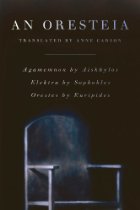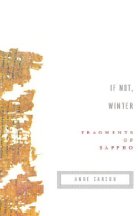
I intended to write about each of these plays individually, but the power of the famous stories and the language as rendered by Anne Carson's stunning translation job, meant that I devoured the whole volume in three sittings and never got the chance to sit down at my computer before the book was over. I've gushed about Carson's own work and her beautiful Sappho translation, and this alternate Oresteia lives up to all my high expectations of her offerings.
But first, a little background: the original Oresteia is a tri-play cycle—Agamemnon, The Libation Bearers, and The Eumenides—by ancient Greek playwright Aiskhylos (often transliterated Aeschylus), which chronicles the murderous fall of the house of Atreus after the Trojan War. Carson's alternate play cycle tells the same basic story and begins with the same play, Aiskhylos's Agamemnon (c. 458 BCE), but then diverges, offering a progression through time: the second installment of the cycle is Sophokles's Electra (c. 401-9 BCE), and the third is Euripides's Orestes (c. 408 BCE). Thus the reader can sense the shifting attitudes toward the same myths over the course of fifty-odd to a hundred years, as Athenian society became less optimistic, darker, more corrupt. Carson writes that the idea for the alternative cycle was originally brought to her by Brian Kulick, artistic director of the Classic Stage Company in New York City, who wrote:
In Aiskhylos' hands the story of the house of Atreus is designed to end in a valedictory celebration of Athenian democracy and its newborn sense of justice; when Sophokles takes over the tale it becomes more complex and contradictory; with Euripides the design is completely turned on its head. We follow a trajectory from myth to mockery. What happened to effect this? History happened. Aiskhylos composed his Oresteia shortly after Athens' victory at the battle of Marathon, which marked the height of Athenian military and cultural supremacy; Euripides finished his Orestes almost a hundred years later as Athens headed for ruin, due to her protracted involvement in the Peloponnesian War...The house of Atreus, for these tragedians, was a way of talking about the fate of Athens.
Kulick makes a fascinating case, but I was concerned that, as a relative novice in ancient Greek literature, I wouldn't be able to pick up on the progression he outlines here. I needn't have worried. The stylistic differences among the three plays are so pronounced that, despite Agamemnon's messy end and Orestes's ostensible resolution, the reader is left feeling much surer of herself and the universe after finishing Aiskhylos's inferno of a play, than after making one's way through Euripides's altogether more ironic, darker offering.
For those not familiar with the famous story being told, it goes thusly: after Paris abducts Helen, her husband Menelaos and his brother Agamemnon, king of Argos, gather their forces to sail to Troy and get her back, beginning the Trojan War. But the goddess Artemis refuses to send the desired wind until Agamemnon sacrifices his own child, continuing a long history of child murder in his family. Agamemnon kills his daughter Iphigenia, earning the hatred of his wife (her mother) Klytaimestra, and the ships set sail. Fast forward ten years, and Klytaimestra receives word that Troy has fallen; she and her lover Aigisthos, both intent on revenge for their own reasons, murder the returned Agamemnon and his prophetess sex-slave Kassandra, planning to rule Argos themselves in Agamemnon's stead. These are the events of Aiskhylos's Agamemnon.
As I mentioned, despite the bloody murder that makes up the body of this play, Aiskylos's language as rendered into English by Carson is such a bonfire blast of virtuosity that I finished it feeling almost giddy. The sense of gut-clenching foreboding and inevitability is pitch-perfect. The malignant patrimony lurking in the House of Atreus is a force of nature, and all the stories anyone tries to tell—be they about the war, or an allegorical tale, or a supposedly happy homecoming—are infected by it. The Greek invaders at Troy "beached in blood"; the chorus claims of one man's pet lion "That thing was a priest of ruin Bred in the / house. Sent by god." When the Chorus tells the story of Paris and Helen, the image of a house cursed by a phantom resonates between Klytaimestra and Agamemnon:
Alas for the house! Alas for the house and the
men of the house!
Alas for the marriage bed and the way she loved
her husband once!
There is silence there: he sits alone,
dishonored, baffled, mute.
In his longing for what is gone across the
sea
a phantom seems to rule his house.
The idea of infection, of seepage from one evil to another, is everywhere in Agamemnon. Klytaimestra, after she convinces Agamemnon to enter the house on a red carpet, against his wishes, gives this masterful speech suffused with rage and grief for the "roots and leaves" of her own family that will never return, a vision of a happy homecoming that is irrevocably perverted by Iphigenia's murder and the consequent murder Klytaimestra herself is planning; a vision of perfection that only infuriates by its distance from the truth.
There is the sea and who shall drain it dry?
It breeds the purple stain, the dark red dye
we use to color our garments,
costly as silver.
This house has an abundance. Thanks
be to gods, no poverty here.
Oh I would have vowed the trampling of
many cloths
if an oracle had ordered it, to ransom this
man's life.
For when the root is alive the leaves come
back
and shade the house against white dogstar
heat.
Your homecoming is warmth in winter.
Or when Zeus makes wine from bitter
grapes
and coolness fills the house
as the master walks his halls,
righteous, perfect.
Zeus, Zeus, god of things perfect,
accomplish my prayers.
Concern yourself here.
Perfect this.
There are so many amazing and exhilarating passages in Agamemnon that I could continue quoting them all day, but in brief: the predominant feelings are of white-hot fury and dread, and of conflicting, equally strong concepts of justice. Everyone in Agamemnon believes with absolute certainty that he or she knows what justice is, and the tragedy comes out of the clashes between these mutually exclusive justice concepts.
In Sophokles and especially Euripides, on the other hand, people struggle to decide what is just, or sometimes knowingly act in opposition to what is just. In a few cases, they even seem to stop caring about justice, or about the tragedy unfolding all around them. (In the second two plays of the cycle, Agamemnon and Klytaimestra's son Orestes returns from exile, and he and his sister Elektra murder their mother and her lover. The citizens of Argos then must decide what to do with the two siblings.) Elektra, for example, finds the title character arrested, unable to either marry out of her mother's household or avenge her father on her own, crippled by her never-ending grief, which she admits is excessive by any social definition. "There is no pity / but mine, / oh Father, / for the pity of your butchering rawblood death," she cries, and "Lament is a pattern cut and fitted around / my mind" Unlike her mother before her, she witnesses herself becoming the next tool of the curse of the house of Atreus, but cannot avert the coming disaster:
By dread things I am compelled. I know
that.
I see the trap closing.
I know what I am.
But while life is in me
I will not stop this violence.
"Evil is a pressure that shapes us to itself," Elektra says. At the end of Agamemnon Klytaimestra believes she has ended the cycle of violence; she attempts to call a truce with the lineage's curse. But Elektra has no such illusions; part of her grief trap is that she recognizes she has been shaped to evil by the evil around her. The fact that Klytaimestra may deserve to die for the deeds she has committed, doesn't absolve Elektra and Orestes from their own guilt; there seems no escape from the cycle. But because the house's cycle of violence has become part of Elektra herself, to break it would be to go against her own selfhood; "I need one food," she says: "I must not violate Elektra." And to Klytaimestra:
Shame I do feel.
And I know there is something all wrong
about me—
believe me. Sometimes I shock myself.
But there is a reason: you.
You never let up
this one same pressure of hatred on my life:
I am the shape you made me.
Elektra's tragedy is that of someone who has been made into the wrong shape, but who cannot now act against her nature.
From Aiskhylos's cleansing fire and Sophokles's self-regenerating corruption, Euripedes's vision seems almost farcical in its irony. Instead of an Elektra wracked by grief, her opening monologue in Orestes seems almost bored:
It's a known fact,
when the gods asked him to dinner he shot
off his mouth.
So Tantalos begot Pelops, Pelops begot
Atreus—
you know all this don't you? the strife, the
crimes...
We've heard it all before, she seems to say, and here we go again. Whereas Sophokles's Elektra is often sickened or horrified by the ways in which her evil situation has shaped her to itself, Euripides's Elektra is either too broken or too cynical to continue surprised at her family's bloodbath. Elektra and Orestes's tragedy in this last play seems, not so much that they have been sentenced to death for their mother's murder, but that the world in which they live is devoid of any overarching meaning or justice. Even the deus ex machina that saves them in the end seems ridiculous and almost random, much like the further murders they're attempting when Apollo arrives to sort them out, or the messenger's report on the democratic meeting called by the citizens of Argos to decide the siblings' fate. It's a far cry from the savage yet conflicting visions of justice held by the cast of Aiskhylos's Agamemnon.
There's far more in these three plays than I can do justice in a single blog entry, but suffice to say I fell utterly in love with the entire cycle, and can't wait to look into Carson's other Euripides translations, published in Grief Lessons. A note on her translation: as you can tell from the many excerpts above, it has a very modern feel, yet (I think) also gives the impression of agelessness. I've heard a few criticisms of places where people feel the language gets too modern, but I found it absolutely galvanizing; I could read Anne Carson's Aiskhylos all month and never wish myself elsewhere. That said, I believe in the usefulness of having multiple translations, especially of works as influential as these plays. If you love the excerpts above, you will love the whole book. If you prefer a different, more Victorian or Modernist feel, you have many translations to choose from. Personally, I only regret that Carson has not yet translated the rest of Aiskhylos's original Oresteia, as I would love to compare and contrast with this alternate version.
An Oresteia was my fourth book for the Clover, Bee, and Reverie Challenge.



